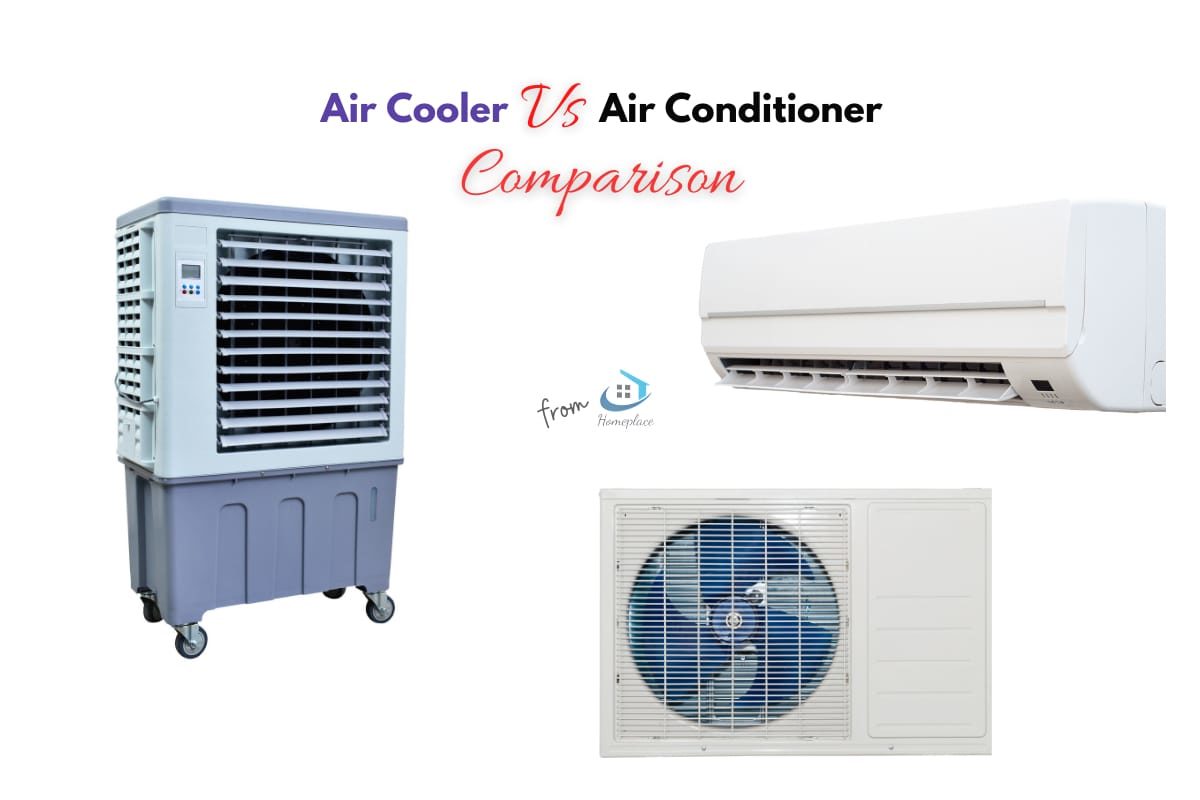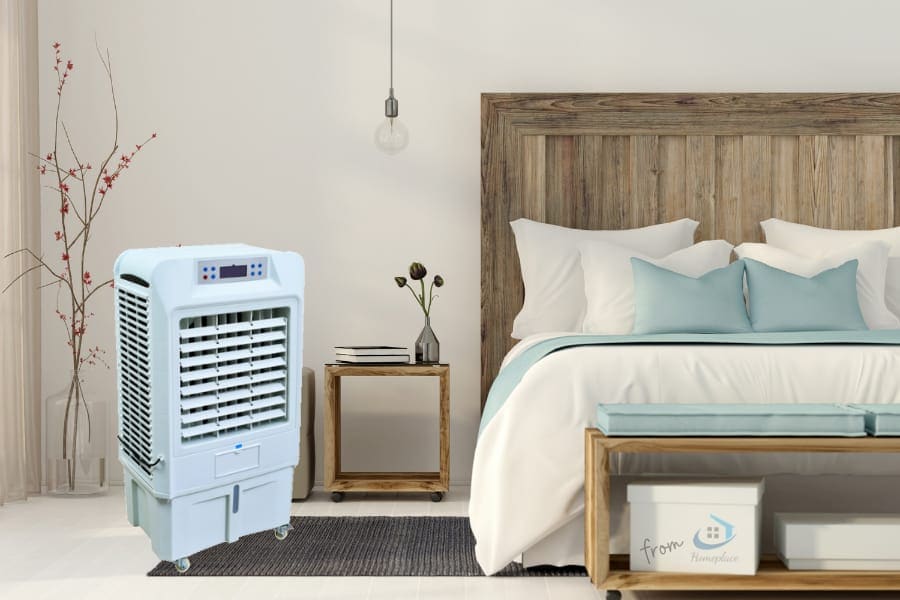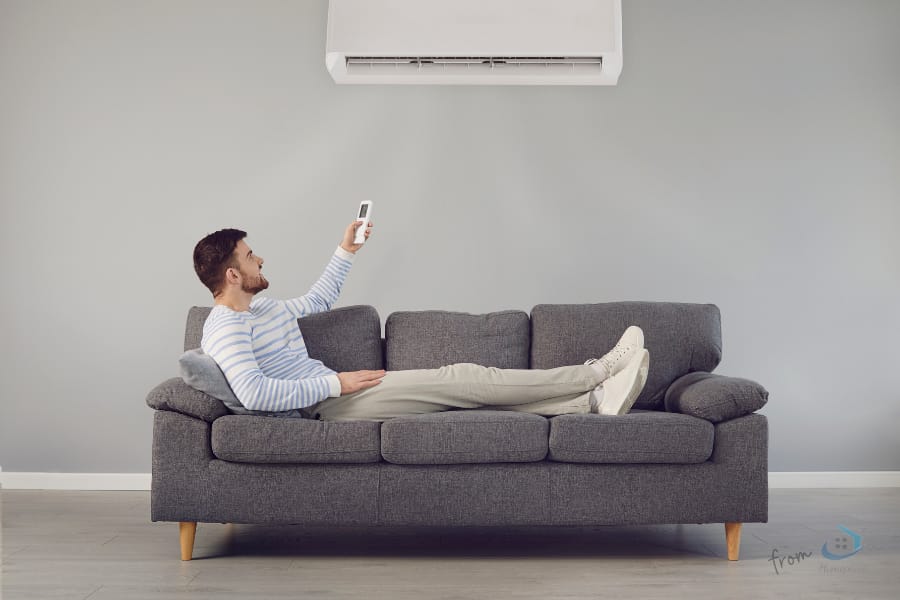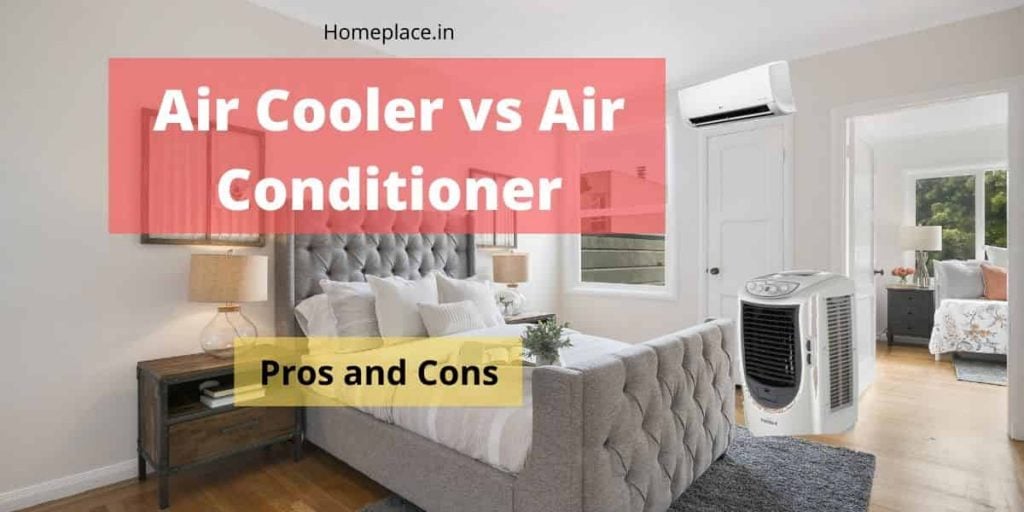When summer rolls by, and with the increase in this scorching heat, the one thing that strikes your mind is an air conditioner or air cooler?
Temperature control and regulation have always been vital aspects of people’s lives. People nowadays prioritize their comfort level, so the need for an air cooler or air conditioner has risen drastically.
If you are also confused about buying an air conditioner or air cooler, you have landed at the right place. This comparative article about air conditioner vs. air cooler will guide you to choose the one that suits your lifestyle and will certainly help you make an informed decision.

Air Conditioner vs. air cooler comparison
| Points of Difference | Air Cooler | Air Conditioner |
|---|---|---|
| Function | An air cooler cools the air by cooling the warm air with water evaporation. | An air conditioner is an appliance intended to change the air temperature of a particular space. |
| Parts | It has only two main parts – a fan and a water pump. | It has four main parts –compressor, condenser, expansion valve, and evaporator. |
| Mechanism | An air cooler works on the principle of evaporative cooling, i.e., it pulls air from the outside environment and delivers it after cooling it down. | It is the critical component of the HVAC (heating, ventilating, and air conditioning) system and works on the vapor compression refrigeration mechanism. |
| Cost | Air coolers are much inexpensive to buy and are a lot more economical to run when compared to an air conditioner. | Air conditioners are way too expensive and cost around six times more than an air cooler. |
| Installation | An air cooler does not require any expert installation. | A proper professional installation is required for an air conditioner. |
| Maintenance | Air coolers are very easy and cost-effective to maintain. | An air conditioner requires regular servicing for its cleaning and proper working. Hence, it is not pocket-friendly. |
| Cooling Effect | Air coolers have less effective cooling when compared to air conditioners. | Air conditioners are powerful cooling appliances, even on humid days. |
| Eco-friendly | Air coolers are eco-friendly as they do not use harmful chemicals for their functioning. | An air conditioner uses CFCs and HFCs as refrigerants which, when released into the environment, can cause adverse effects. Thus, it is not eco-friendly. |
| Best Suited Climate | It works best in hot and dry areas. | It works effectively in all seasons. |
| Fresh Air | The air coolers pull in air from the outside environment, and then after cooling, it releases into the atmosphere. Therefore, the air circulation is adequately maintained, and pure, fresh air is expelled. | The air conditioners work in a closed space. Hence, air circulation takes place only internally, and as a result, the air expelled is not fresh. |
| Power consumption | Air coolers consume much less electricity. It uses around 80% less electricity when compared to air conditioners. | On the other hand, air conditioners consume around 3000 to 5000 watts of electrical energy per hour. Thus, it consumes way more power than an air cooler. |
| Health | It employs water as the cooling agent; hence, it has no harmful effects on health. However, the water needs to be changed regularly. | The air conditioner’s ducts are home to several bacteria, slime, allergens, etc., which, when released into the atmosphere, the ducts can cause adverse effects on human health. |
| Portability | The air cooler is portable and easy to transfer from place to place. | It is enormous and heavy in size. Thus, it is fixed on a wall and cannot be moved. |
| Usage | It can be used indoors and outdoors. | It can only be used indoors, with doors and windows closed. |
Air Coolers
Air coolers are also known as evaporative coolers or swamp coolers. As hot air flows over water, it transfers the latent heat to the water cooling the air. Air coolers provide a high airflow and are ideal during hot months. However, it does suffer certain drawbacks.
Read: Best Air Cooler in India

Advantages of air coolers
One of the significant benefits of air coolers is that they are a lot more economical to run when compared to air conditioners. Its starting price is Rs3,000 and exceeds up to Rs15,000. In addition to its low cost, an air cooler consumes around 80% less electricity than an air conditioner. In all, an air cooler is a budget-friendly appliance.
Unlike air conditioners, air coolers use water as the cooling medium instead of CFCs and HFCs. As this natural air-cooling method does not rely on hazardous chemicals. Thus, it is safer for the environment and human health.
The air circulated by air coolers is pure, fresh, and refreshing as they often come with air filters. The atmosphere is full of moisture as the air cooler pulls air from the outside environment and releases it after cooling down. Hence, air coolers circulate fresh air and are preferable for asthma patients or people suffering from respiratory disorders.
One of the best features of an air cooler is that it can easily be carried from one room to another. Most air coolers are lightweight and can easily be picked up and moved from one place to another. The air conditioner lacks this feature as it is fixed to a wall and cannot be moved. It also requires very little space when compared to an air conditioner.
Dissimilar to air conditioners, there is no need for any professional or skilled person to install an air cooler in your house. Any adult can easily install it as all you need to do to place the air cooler by a window to pull air from outside.
Maintaining an air cooler is also a straightforward job. It does not require complex servicing like ACs; hence, it saves the service charges. You can get all the necessary information about its cleaning and maintenance in the user manual of the air cooler.
Drawbacks of air coolers
As we know, air coolers work on the principle of evaporative cooling. In humid areas, the air is already rich in water (in the form of gas), which makes evaporation slower or almost negligible. Due to this, air coolers cannot cool the air to its full extent and work merely as fans. Hence, for areas with high humidity, an air conditioner is the only best option.
An air cooler utilizes water as a cooling agent. Hence, the water in the cooler needs to be changed daily because if not done, it will become the home to bacteria, algae, slime, mold, etc. Also, chilled iced water is used in coolers during hot summer days. With constant use, the water will become hot, and you will have to change the water again. This is a very hectic and tiresome task.
Although the air cooler provides cooling, it is not as powerful as an air conditioner. Air coolers can make you feel relaxed, but an air conditioner can make you feel chilly. Air coolers are built with a powerful technology that enables them to cool the area faster. Air coolers do not have such technology and require much more time to cool the room.
An air cooler cannot work in a closed environment like an air conditioner. If there is poor ventilation or the windows and doors are closed, there will be no proper air circulation. As a result, the room’s humidity will go on increasing, and the air cooler will no longer cool the air and will merely work as a fan.
The fans fitted inside the air cooler for rapid and successful evaporation create a lot of noise. Although the noise transmitted depends on the air cooler brand, it is not suitable for people who are sensitive to sleep. However, you can reduce the noise by placing the cooler on your balcony or outside the room.
Best Uses of air cooler
Depending on its work mechanism, an air cooler provides a fresh and better quality of air compared to air conditioners. It is best suited for people living in dry and hot areas. Moreover, it is an affordable alternative to air conditioners and can easily be carried from one place to another.
Air Conditioners
An air conditioner is a system designed so that it cools down an enclosed place by eliminating heat and controlling the humidity of the air, and moving it to some other external region. This cold air is then transmitted via ventilation throughout the enclosed space (room or building).
Often known as a “split-system”, it is a vital HVAC system component (heating, ventilation, and air conditioning). Air conditioners work on vapor-compression refrigeration. These are available in various sizes ranging from small units used within vehicles or single rooms to massive units used to cool large apartments and buildings.
Read: Best 1.5 Ton Split AC in India

Advantages of air conditioners
In high-humid areas, the environment is already rich in water, i.e., there is a high level of humidity in the air, due to which there is no space for extra moisture. In such areas, an air conditioner paired with a dehumidifier allows regulating the temperature and humidity level of the area. It works like a charm due to its powerful compression technology.
An air conditioner provides significantly better cooling effect than an air cooler and is faster at bringing down the ambient temperature. It can drop the surrounding temperature by roughly ten degrees. Its high-speed fan evenly distributes the cool air to every part of the room (or any place), thereby making the room chilly.
As the temperature goes down, so does the amount of sweating. Since it causes losing a significant amount of water intake, it is crucial to stay hydrated in scorching weather. Air conditioners cool the environment, reduce water loss and prevent dehydration.
Another issue caused by sweltering temperatures is heatstroke. Too much heat makes it difficult for the body to regulate the body temperature, resulting in damage to the brain and other organs. Since air conditioners reduce the temperature of the space, they minimize the risk of heatstroke to a certain extent.
In addition to reducing the humidity of the environment, an air conditioner also lessens the amount of pollen, mold, mildew, and many other outdoor airborne allergens which cause the potential symptoms of asthma. It also reduces exposure to indoor allergens like dust mites, etc., hence reducing asthma attacks.
An air conditioner in an office, school, or at home brings about a sense of comfort. Doors and windows are closed in air-conditioned rooms, thereby creating less noise creating a soothing environment. You can work or study without being stressed. An air conditioner also provides a better quality of sleep by maintaining a cooler temperature in your room.
Drawbacks of Air Conditioners
One of the most prevalent truths is that air conditioners are way costlier than air coolers. Generally, ACs cost around Rs25,000 to Rs50,000, which is 6 times more expensive than an air cooler. Apart from the purchase cost, air conditioners consume around 3000 to 5000 watts of electricity per hour depending on the season– the hotter the weather, the more power is used.
Air conditioner employs CFCs and HFCs as refrigerants, which increase the holes in the ozone layer over time when released into the environment. Moreover, air conditioners are also the culprit behind pollution. The chlorofluorocarbons released into the air is a significant source of ozone depletion. For this reason, modern air conditioners use use R410a refrigerant that has zero Ozone Depletion Potential (ODP) and 2088 Global Warming Potential (GWP) where CO2 has only 1 GWP.
Read: R20 vs. R32 vs. R134a vs. R290 vs. R410a Refrigerants
Besides having an impact on the environment on a larger scale, air conditioners also affect the health of human beings. The air conditioner’s ducts collect dust, allergens, and bacteria over time, and every time the air conditioner is turned on, these harmful bacteria are released into the atmosphere, posing a health risk to humans.
Spending an excessive amount of time in an air-conditioned room can result in dryness of skin, which in turn can lead to a variety of significant skin disorders. Your skin loses moisture and hence becomes sensitive to different allergens.
Also Read: Advantages and Disadvantages of Inverter AC
Best Uses of air conditioner (AC)
The best aspect of an air conditioner is that it can be used in all seasons. Air conditioners alter the property of temperature, humidity, and air to your comfort level. The remote with an air conditioner is a cherry on the top for people who don’t like to get up from their place to change the temperature setting. It can heat and cool the environment rapidly and are very powerful due to its refrigeration system.
Frequently Asked Questions (FAQ)
In terms of working conditions, cooling capacity, maintenance, and brand reputation, an air conditioner can be a good choice for you. On the other hand, if you are more concerned about cost or relocation flexibility, you can choose an air cooler.
Both the air cooler and conditioner can create health problems if not used in the right way. Firstly, you must position and place it at a suitable location from which the cold air does not flow directly to the user’s body. Air coolers are known to minimize dust and other harmful allergens to an acceptable level. However, if you have a history of asthma, I recommend not to use an air cooler. Instead, try an air conditioner.
The working principle of air coolers is based on the evaporation process. The hot air passes over the cooling water utilizing a blower. As a result, the air loses heat, letting the water evaporate. Finally, you can get a colder breeze of air. On the other hand, Air Conditioners work on the refrigeration cycle. A refrigerating liquid is called a refrigerant. It involves mainly a compressor, a condenser, and an evaporator. In this process, the cooling is more efficient. Air conditioners can work in any weather condition irrespective of the outside temperature and humidity. But if you live in an area where the weather is humid, air coolers do not work well. In that scenario, a Portable Air Conditioner can be a good choice.
Air coolers are way cheaper than air conditioners. While the starting price of a good quality air cooler is around Rs 4000, an air conditioner from a reputed brand can cost you anywhere between Rs 20000 and 30000. So, if you are tight on the budget, an air cooler can suit you the most. Despite the high cost, an Inverter Air Conditioner can help you to lower electricity consumption.
The position of the air conditioner should be decided carefully as per the room design. You need to position the cooling appliance so that it should not blow the cold air directly towards you. It may cause illness. Once it is fixed and the AC is installed, relocating it can cost your money and precious time. On the contrary, an air cooler is easier to handle and portable. You can relocate and position it according to the requirements.
An air conditioner is more efficient than an air cooler in performance. The cooling capacity of an air conditioner is far more because of the refrigeration system. While the cooling capacity of an air cooler increases with dry weather, it does not fluctuate in the case of an air conditioner.
Both of the appliances can cause you health problems if misused. Cooling appliances should be fixed in such a manner that the cold air does not flow directly to your body. It can cause various health problems such as cold and cough. A cooler is effective in minimizing dust and pollen inside the room, reducing allergy problems. But, air coolers also increase humidity in the living room. Those who have a previous history of asthma can get into trouble.
Air coolers are more maintenance prone than air conditioners regularly. If the water in your area is hard, it can form scaling inside the water storing compartment of an air cooler. Removal of such scalings can be difficult. On the other hand, air conditioners are primarily maintenance-free. If there is any abnormality, it’s better to call your brand’s customer service and get it solved. You can also give AMC to the manufacturer to do routine maintenance. Generally, user interaction for the maintenance of AC is less required.
If operated and maintained correctly, both the air cooler and conditioner can last for long years. The average lifespan of an air conditioner is around 15 years, while coolers can last about 20 years. With time, gradually, both of these lose efficiency. All spare parts for standard cooling appliances are readily available in the market. So, do not worry.
Consumption of electricity is a significant concern for every household. However, installing an electrical appliance will increase the electrical bill, more or less. Air conditioners consume more power due to the inbuilt compressor. A 1.5-ton split AC consumes around 1.5 kW power per hour. For a running time of 4 hours a day, 6 kW power will be consumed. On the contrary, air coolers draw much less electricity. A standard air cooler consumes 0.2 kW of electricity per hour. For the same duration of time, it can cost you a price of only 0.8 watts of electricity. Therefore, we can conclude that an air conditioner consumes around 7.5 times the electricity consumed by an air cooler. Also, calculate power consumption using this online calculator to choose a suitable AC.

Air conditioner vs. air cooler – which is better for what purpose?
Today every household needs an alternative cooling solution to the ceiling fans or pedestal fans. An air cooler or conditioner can be a great alternative with higher cooling efficiency. Both air conditioners and air coolers serve the sole purpose of providing a cooling effect during hot summers. From the above analysis of air conditioner vs. air cooler, you can clearly understand that an air conditioner is more efficient in cooling.
If you live in a hot, humid area, an air conditioner is the only one to save yourself from the scorching heat. If the budget is around ₹30000 to ₹50000, an air conditioner is the best cooling solution for you. Although it is costlier than an air cooler, it cools the environment quicker than an air cooler.
But if you have got a tight budget and are thinking of reducing electricity bills, it is recommended to buy an air cooler. However, an air cooler has limited use as it works well only in hot and dry areas. In other areas, it works only as a fan.
Considering your budget, lifestyle, personal requirements, comfort, temperature level, and the type of climate you live in, decide whether to buy an air conditioner or an air cooler.
Related Posts:
